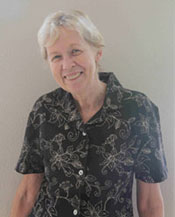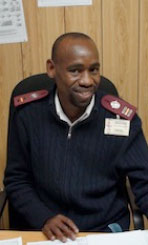
Mr. Thabani Zuma is a professional nurse who works in the Ethembeni HIV Treatment Clinic in a small hospital, tucked away deep in the heart of Zululand, the epicenter of the HIV epidemic in South Africa. The remote location, harsh living conditions, and bad roads make it difficult to recruit doctors here, so nurses-the backbone of the health services-must carry the load. But traditional nursing education has not prepared them to prescribe and dispense the powerful, lifesaving antiretroviral treatment drugs. So the South African Government in collaboration with international aid agencies now offers courses to prepare nurses for this expanded role. Mr. Zuma attended this program and achieved 96% on the certifying examination, the highest score in the class. He seems like a good candidate for the nurse mentor course we will sponsor, and I invite him to tea to see if he is interested.
Mr. Zuma is a tall, slim thirty-four year old Zulu man. He is dressed in his nurse uniform-blue slacks and sweater, white shirt, and the maroon, military-style epaulets that nurses in this part of the world wear to signify their status. When he speaks, his sentences are punctuated with laughter and his whole face lights up and dances. We chat a bit and I ask him what led him into nursing. He tells me his story.
Mr. Zuma was born during apartheid in a black township in Durban, South Africa. His father worked as a security guard in an industrial part of town. When he was two, the family “had to move” thirty eight kilometers away to Fredville. He is not sure why.
He attended primary school in Fredville and then won a scholarship for a boarding school back in Durban. After he graduated, the company that had sponsored him encouraged him to study mechanical engineering. He had really wanted to study medicine, but there was no money for that, so he agreed to enroll in the engineering course. He graduated in 1999 and was awarded the National Diploma.
“But then it went all black-I couldn’t get a job. When I went for interviews they said, ‘No, we’ll call you back’, and then they never called back. When I went for other interviews at other companies, they’d say, ‘No, you are overqualified for the post that was advertised.'”
Mr. Zuma knew he had to do something. He had eight people to support. No one at home was working and by then he had fathered a daughter.
“I couldn’t get a job-yes-but the job that was available to me was driving a taxi.”
My mouth must have dropped. When I hear the word “taxi driver,” I picture a reckless guy slouched behind the wheel of a beat up van, his arm hanging out the window-not the intelligent young nurse sitting across the table from me. Taxi drivers on the continent are a law unto their own. They disregard the rules of the road, cut in front of you at will, and stop in the middle of the road to drop off or pick up passengers. Many taxis are unsafe and become death traps for the people crammed inside. Mention the word “taxi driver” to the ordinary motorist and you will get a mouthful of vitriol. Yet these 16-seater minibuses are the source of transport for over half the population. I asked him what it was like to drive a taxi.
“A nightmare. You know how taxi drivers are. When I tell people the story now, they ask, ‘How did you get out of being a taxi driver and start doing something constructive?’ Because you get stuck there. You get quick cash-good money depending on how fast you drive and how many people you squash in.” We laugh.
“Honestly-good cash-I wouldn’t lie.”
Mr. Zuma worked as a taxi driver for four years. But he wanted more than good cash, and he continued to look for other opportunities. During those years he took vocational courses and earned certificates in baking, in entrepreneurship, in catering. Still no job.
Then one day he received a recruitment letter in the mail.
“The Department of Health was looking for people who wanted to do nursing. I thought with nursing I may be able to do one or two things I wanted to do. I had wanted to be a doctor. Nursing was a part of it. I wanted to help people. I put in my application and-Walla!-this was it-they said I must start.”
Mr. Zuma had an excellent high school record and was accepted into the College of Nursing at Grey’s Hospital and awarded a stipend. With this income he could help his family as well as cover his own expenses. During the apartheid years hospitals were segregated by race, and Grey’s had catered only for whites. But by 2003 apartheid was nearly dead, and the hospital served everyone.
“Nursing school-it was difficult! Anatomy and Physiology was my nightmare.”
But he made it through.
“My area of interest was the operating theatre. I could see doctors opening people and doing things-I would have loved being a surgeon.”
When Mr. Zuma graduated in 2007, he applied for a position at Ethembeni Clinic because one of his relatives was employed here.
“It used to be nurses just take care of sick people, follow doctor’s orders. But here most of the things we do ourselves. This clinic is different from working in the wards. What we do we are accountable for.”
In the years that followed, Mr. Zuma became quite the expert in HIV care and treatment. When the nurses have a problem, he is the one they call. When he himself has a problem or a question, he gets in touch with one of the doctors in his network or phones the 24 hour hotline for HIV clinicians.
“If I am not sure of what I am doing, I am putting that life in danger. I should ask.”
Mr. Zuma has been carrying a heavy load of responsibility in this remote area for over four years. During the week, he stays in the Nurses’ Residence in one of the few en suite rooms. But he spends weekends at home.
“I like being at home. Every Friday afternoon I drive two and a half hours to Fredville. And every Monday morning I leave my house at four in the morning and arrive at the clinic by seven.
“I love what I’m doing right now. I must tell you. I really like ART’s [antiretroviral therapy]. I can see progress. That’s the main thing. You see the client today. When you see the client three months down the line, you see progress. That’s lovely. You say, at least I’ve done something that helped this client. That keeps me here. I’m happy.”
“Do you think you’re going to stay?”
“Well, I’ve never seen myself in the office, sitting there in front of the computer, because I love people. Right now I’m doing the one year course on Primary Health Care. They teach us the steps to take to properly diagnose the patients, not just to treat. Let me tell you one story.
“The other day after I had been at my course, a client came in. I looked at him and said I wonder what is wrong with him. I examined him and he had hepatomegaly, an enlarged liver. I never used to do that, diagnose patients myself.”
“The passion that you’ve got-it goes a long way. With me it’s the passion.”
I tell him that we would like to prepare him as a mentor for other nurses. He agrees.
“Whenever I am exposed to new information, I would love to share. Afternoons, when it is quiet, I bring people together-lay counselors, caregivers, and others-and say, let me teach you about one big word that I know.”
Mr. Zuma also sees patients in the outreach clinics. People in the area are poor and transport, including taxi service to the hospital, is limited and costly. So the nurses go out to the community and treat patients in thatched huts, under trees, or in churches.
“I feel for this area. Here they see the difference you are making in their lives. When you go out, people come to thank you with a bucket of potatoes or cabbages, spinaches. Just the appreciation makes you want to do more. It’s one lovely area. I won’t lie to you.”

We finish our tea and get ready to go back to the clinic. The weekend is almost here and Mr. Zuma will start on his long drive home to Fredville.
“My aunt has got taxis,” he tells me. “When a driver needs to go somewhere on Saturdays and asks me nicely, I drive. There’s no harm in that. Like I told you, for me, people are all the same.
“Sometimes the people tease me, ‘Oh, today we’re got a doctor driver.’
“And I say to them. No, I’m trying to push you people to see that when you are here, it doesn’t mean the end of the world, and when you are up there, it doesn’t mean you can’t mix with people down here. With me everyone is the same. I am driving with you.”
I will never again look at a taxi driver slouched behind the wheel, arm hanging out the window, without thinking of Mr. Zuma. I will always wonder…